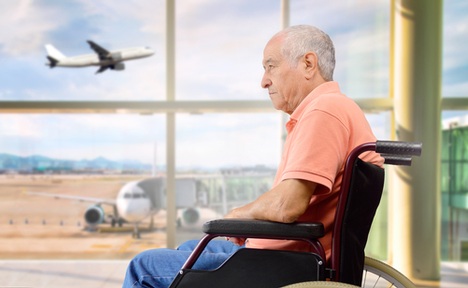New charter demands airlines give disabled flyers a real break
A new Passenger Charter is to be adopted say ministers, to ‘improve experiences’ and tackle poor treatment of disabled and elderly travellers using airports and airlines.

The government's charter is aimed at improving staff training, raising the compensation limit on lost or damaged mobility equipment such as wheelchairs and ensuring the industry works to get passengers’ own wheelchairs on planes.
It is part of the government's aviation strategy being considered in a 16-week consultation, starting in December. Ministers say the government’s policy will be finalised in 2019.
On 7 December during a visit to Gatwick airport to see its accessibility facilities for disabled people, the Aviation Minister Liz Sugg outlined the charter’s proposals.
The Aviation Minister said: “We are determined to work with industry to continue to drive up service levels and the new passenger charter aims to improve the experience of all passengers when they fly”.
Accessibility Minister Nus Ghani, who also visited Gatwick Airport, said: “We need to address the fact that 57 per cent of disabled passengers say they find flying and using airports difficult.
“That’s why our proposed passenger charter includes measures designed to make real changes that will improve the accessibility of flying."
Airlines and airports will sign up to the charter and the Civil Aviation Authority will monitor their performance and gain enforcement powers to hand out fines for accessibility breaches as well as compensation measures.
'Strapped in like Hannibal Lector'
Reports of disabled travellers being stuck on planes for hours, lost or broken mobility equipment and poor treatment by airline staff, has prompted disability rights campaigners to push the government for improvements.
Passenger Claire Harvey said: “Depending on how you enter the plane you watch your chair go off, hoping it makes it (a few times it hasn’t!). I then have to go in the aisle chair, where you are strapped in like Hannibal Lecter.”
Chris Wood, Flying Disabled founder, said he was looking forward to working with government and industry on the charter "to enhance the flying experience for disabled passengers and truly open it up for all, including on our long-term aspiration of passengers being able to fly in their own wheelchairs.”
Poor treatment of disabled travellers at transport hubs and tourist sites across the country has been revealed in a report by user experience agency, Sigma.
The report analysed 132 UK transport hubs and leisure venues and found a lack of awareness of how staff could make venues accessible to people with autism, in contrast to the vast majority’s response to wheelchair access requests.
'Assistance' may not mean a wheelchair
Molly Watt, a deafblind passenger describes her experience of travelling through an airport in the report.
Ms Watt said: “As soon as you say, ‘Yes I would like assistance’, they assume you would like a person to come with a wheelchair.”
Sigma's managing director, Hilary Stephenson, said of the new charter: “Whilst this is a positive development, it’s extremely overdue, as the aviation industry has consistently fallen short on disability access for decades.
“We found worrying inconsistencies across the board. Only 33 per cent of the sites we contacted for information on autism access even responded to our request, in comparison to 58 per cent of venues that responded to a wheelchair access request.
“This underlines a clear lack of education around the needs of people with ranging abilities."
Gatwick airport has introduced new facilities for passengers with disabilities, including security lanes and a specially built lounge specifically designed for passengers who require assistance.
The government's charter has the backing of Airlines UK, an association representing 13 UK airlines, including British Airways, Virgin Atlantic and EasyJet.
A Virgin Atlantic spokesperson said: “We’re always exploring new ways to enhance this, particularly for our customers who need more assistance; whether that’s familiarisation days on our aircraft, or the latest technology advancements, including our new inflight entertainment designed for our customers with sight loss.
"We look forward to building on these initiatives and many more with the support of the government and a new aviation strategy”.
But Sigma's managing director has warned: “In our experience, most organisations want to do more – but have not made their accessibility policy or staff training a priority.
"It’s therefore vital that this new charter is adopted, in order to deliver positive change across an industry which has rested on its laurels for far too long.”
Latest News
 29-Jul-24
Dementia Bus gives carehome.co.uk staff insight into life with dementia
29-Jul-24
Dementia Bus gives carehome.co.uk staff insight into life with dementia
 01-Mar-24
Find out the top care homes in 2024
01-Mar-24
Find out the top care homes in 2024
 21-Mar-23
UK's top care homes in 2023 revealed
21-Mar-23
UK's top care homes in 2023 revealed
 03-Jan-23
carehome.co.uk launches free care helpline
03-Jan-23
carehome.co.uk launches free care helpline
 13-Dec-22
5 mins with Emily Whitehurst, chief operating officer for Constantia Healthcare
13-Dec-22
5 mins with Emily Whitehurst, chief operating officer for Constantia Healthcare